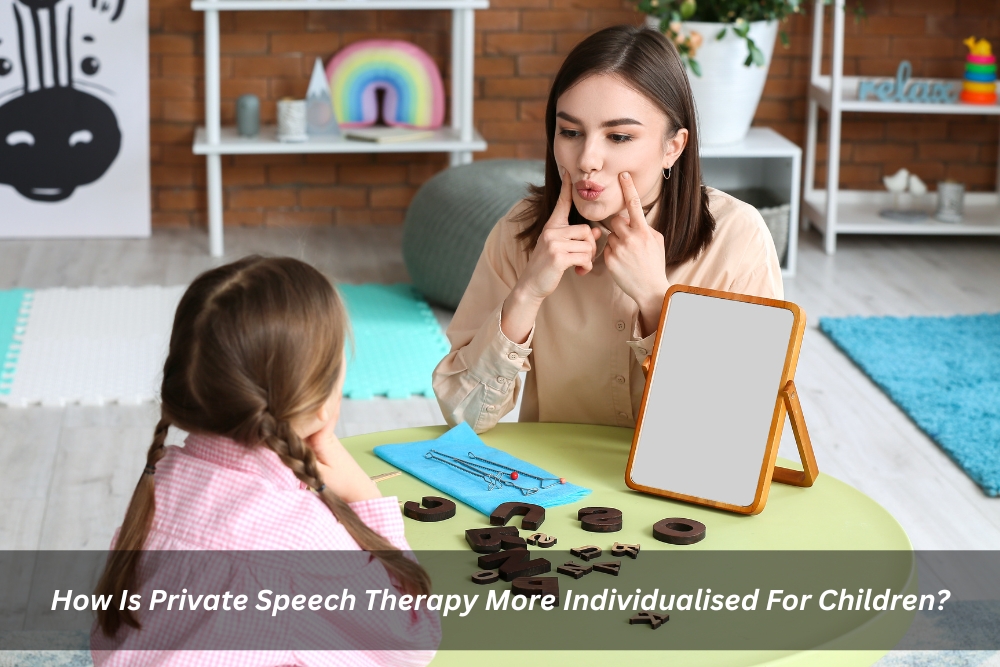Every child develops at their own pace. However, if you’re concerned about your child’s speech or language development, speech therapy can provide invaluable support. While school-based speech therapy is a fantastic option for many children, private speech therapy for children offers a unique level of individualisation that can significantly benefit your child’s progress.
Why consider private speech therapy for your child?
While school-based speech therapy offers valuable support for many children, it can sometimes feel like a one-size-fits-all approach. Class sizes and time constraints can limit the therapist’s ability to focus deeply on each child’s unique needs. This is where private speech therapy shines. It bridges this gap by providing a highly personalised experience for your child.

Here’s how private therapy makes a difference:
- Laser focus on your child: In private sessions, your child gets the therapist’s complete attention. This allows for activities, explanations, and exercises to be tailored specifically to their learning style and individual needs. Imagine the therapist having a toolbox filled with all sorts of strategies, and in private therapy, they can pick the perfect tools just for your child.
- Faster progress on the communication path: With personalised goals and a therapist fully invested in your child’s success, private therapy can often lead to quicker progress compared to group settings. It’s like having a dedicated coach cheering your child on every step of the way, helping them master communication skills faster.
How does private speech therapy tailor to your child’s needs?
Private speech therapy starts with a thorough evaluation. Unlike school-based assessments, which may be more streamlined due to time constraints, private therapists take the time to conduct an in-depth evaluation. This may involve:
- Detailed discussion with parents/caregivers: The therapist gathers information about your child’s developmental history, communication challenges, strengths, and interests.
- Standardised assessments: These validated tests assess your child’s speech and language skills in specific areas.
- Informal observations: The therapist observes your child interacting and playing to gain a deeper understanding of their communication style and preferences.
By gathering this comprehensive data, the therapist creates a personalised treatment plan targeting your child’s specific speech or language delays.

Targeting specific challenges
Private speech therapy for children allows therapists to address a wider range of communication challenges. For example, the therapist can focus on:
- Articulation difficulties (trouble pronouncing certain sounds)
- Receptive language delays (difficulty understanding spoken language)
- Expressive language delays (difficulty using language to communicate)
- Social communication skills (using language effectively in social situations)
- Developmental apraxia of speech (difficulty planning and coordinating the movements needed for speech)
- Fluency disorders (stuttering)
This targeted approach ensures your child receives the most effective therapy for their specific needs.
How does private speech therapy cater to your child’s preferences?
Learning is most effective when it’s engaging. Private speech therapists understand this and use your child’s interests to create a fun and motivating therapy experience.
For instance, if your child loves dinosaurs, the therapist might use dinosaur toys or stories to practice articulation or vocabulary skills. This personalised approach makes therapy sessions more enjoyable and helps your child stay engaged, leading to better outcomes.
Additionally, private speech therapy offers scheduling flexibility. You can choose sessions at a time that best fits your child’s routine and avoids any potential clashes with school or extracurricular activities.
How can you maximise the benefits of private speech therapy?
Active parental involvement
A key advantage of private speech therapy for children is the strong emphasis on parental involvement. The therapist will work closely with you to understand your child’s communication challenges in everyday settings. They’ll then equip you with strategies and techniques you can use at home to reinforce therapy goals.
Regular practice sessions at home, incorporating the therapist’s guidance, play a crucial role in accelerating your child’s progress.
Consistency is key
Whether it’s practising new sounds, working on vocabulary development, or engaging in social communication activities, consistency is key. By regularly incorporating the therapist’s recommendations into your daily routines, you create a supportive environment for your child’s communication skills to flourish.
Is private speech therapy right for your child?
There’s no magic formula for deciding between public school speech therapy and private therapy. Both options offer valuable support, and the best fit depends on your child’s unique situation. Here are some key factors to consider:

- Your child’s needs: Think about the specific challenges your child faces. If they have mild delays or their communication difficulties only affect certain areas, school-based therapy might be sufficient. However, if their delays are more severe or encompass a broader range of communication skills, private therapy might offer a more targeted approach.
- Severity of communication challenges: The severity of your child’s communication difficulties plays a role. For significant delays or complex communication needs, private therapy can provide a more intensive level of support.
- Schedule and budget: Consider your family’s budget and schedule. Private therapy typically involves additional costs compared to school-based services. However, private therapy often offers more flexible scheduling options, which can be beneficial for busy families.
Getting guidance
Talking to a healthcare professional or a speech therapist is an excellent way to gain further insight. They can assess your child’s needs and recommend the most appropriate approach based on your specific circumstances.
Conclusion
If you’re looking for a highly personalised approach to supporting your child’s speech and language development, private speech therapy for children can be a powerful option. With a focus on individual needs, engaging activities, and strong parental involvement, private therapy can help your child reach their full communication potential and thrive in all aspects of life.
Unlock your child’s communication potential with Auburn Health
At Auburn Health, our passionate speech therapists are dedicated to helping children of all ages develop strong communication skills. We understand every child learns differently, so we create personalised therapy plans that cater to their unique needs and interests.
Curious how private speech therapy at Auburn Health can benefit your child? Contact us today for a free initial consultation. We’ll chat about your child’s communication journey and explore how our therapists can empower them to express themselves clearly and confidently.


